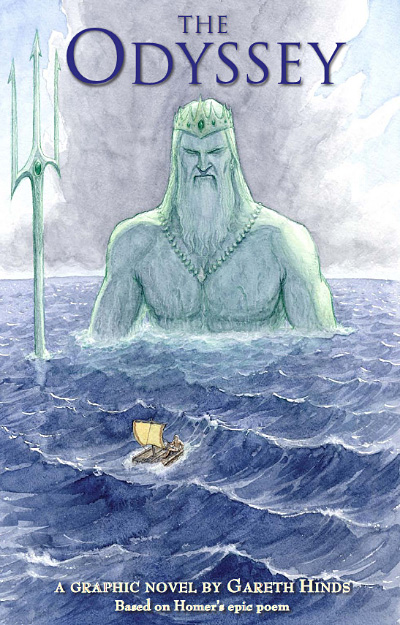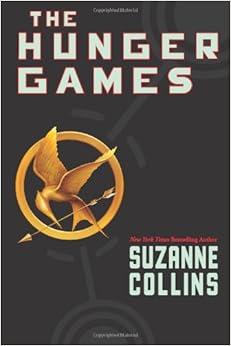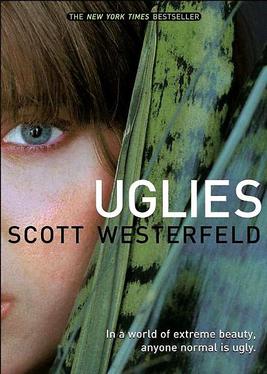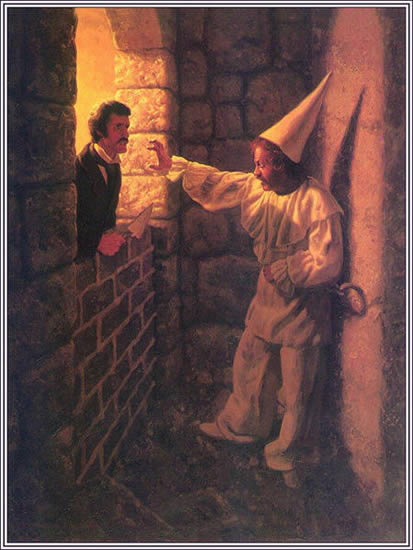I feel like many English teachers teach the books they do because they are comfortable with them. They have been taught before; they know what to teach using them because someone taught them what to teach. They do not have to re-analyze the books. I wonder how curriculum would change if this wasn't the case? That's what I was thinking when I put this list together.
 We would start off with The Odyssey by Gareth Hinds. Why this version? It's a graphic novel. The story is all there, but there are also pictures to help people clearly understand what is going on. No reason why I should make this harder than it needs to be when we're just looking at the story, in my opinion.
We would start off with The Odyssey by Gareth Hinds. Why this version? It's a graphic novel. The story is all there, but there are also pictures to help people clearly understand what is going on. No reason why I should make this harder than it needs to be when we're just looking at the story, in my opinion.
 Halloween over, we would start our next unit by reading Markus Zusack's The Book Thief. Aside from loving this book, I am including it because I think WWII is something that is usually studied in the 10th grade, specifically. I remember reading Elie Wiesel, and while that gave me a great picture of the Holocaust, the books were so dark that I had a hard time reading them. I feel like The Book Thief presents the story from another angle and in a way that still lets you know how horrible it was without making you need to put the book down. Some people may say I shouldn't soften the Holocaust. I think I would bridge that with nonfiction accounts of what happened, short memoirs we would read in class and discuss.
Halloween over, we would start our next unit by reading Markus Zusack's The Book Thief. Aside from loving this book, I am including it because I think WWII is something that is usually studied in the 10th grade, specifically. I remember reading Elie Wiesel, and while that gave me a great picture of the Holocaust, the books were so dark that I had a hard time reading them. I feel like The Book Thief presents the story from another angle and in a way that still lets you know how horrible it was without making you need to put the book down. Some people may say I shouldn't soften the Holocaust. I think I would bridge that with nonfiction accounts of what happened, short memoirs we would read in class and discuss.
 Next up would be our one nonfiction book, The Color of Water: A Black Man's Tribute to His White Mother by James McBride. I considered reading this right after The Book Thief, but Christmas got in the way and I decided to come at it from this angle instead. This is a book where we see someone trying to meet society's expectations and then rejecting them in favor of living the way he wants to. The mother goes through the same process, so the lesson is actually taught twice in the same book. This book would also be an avenue for discussing equality in race and religion (and gender, though that isn't directly discussed, as far as I recall).
Next up would be our one nonfiction book, The Color of Water: A Black Man's Tribute to His White Mother by James McBride. I considered reading this right after The Book Thief, but Christmas got in the way and I decided to come at it from this angle instead. This is a book where we see someone trying to meet society's expectations and then rejecting them in favor of living the way he wants to. The mother goes through the same process, so the lesson is actually taught twice in the same book. This book would also be an avenue for discussing equality in race and religion (and gender, though that isn't directly discussed, as far as I recall).
 From there, we'd hit either The Hunger Games (Suzanne Collins) or Uglies (Scott Westerfield). These are both dystopian YA books, and we would use them to discuss the question "What is best?" Everyone in this world seems to believe others should live by their system of ethics. I would probably also teach some lessons in propaganda while we were at it, because people believe it and I hate seeing all the propaganda junk that comes up on my Facebook feed (there, of course, because my friends share it). As a class, we would identify which values the higher society idolizes and figure out where things went wrong. We would then apply it to now: Which values do we idolize?
From there, we'd hit either The Hunger Games (Suzanne Collins) or Uglies (Scott Westerfield). These are both dystopian YA books, and we would use them to discuss the question "What is best?" Everyone in this world seems to believe others should live by their system of ethics. I would probably also teach some lessons in propaganda while we were at it, because people believe it and I hate seeing all the propaganda junk that comes up on my Facebook feed (there, of course, because my friends share it). As a class, we would identify which values the higher society idolizes and figure out where things went wrong. We would then apply it to now: Which values do we idolize?
 I would then end the year by going through a book chosen by the class. I would have the class choose the book early in the year so I have time to read it and think about it, and then we would discuss the book and the issues the book discusses. I'd end the year like that because I know they would be drowning in projects, and if they can have fun English reading, they may get their homework done. No reason why I should punish them, after all.
I would then end the year by going through a book chosen by the class. I would have the class choose the book early in the year so I have time to read it and think about it, and then we would discuss the book and the issues the book discusses. I'd end the year like that because I know they would be drowning in projects, and if they can have fun English reading, they may get their homework done. No reason why I should punish them, after all.
 We would start off with The Odyssey by Gareth Hinds. Why this version? It's a graphic novel. The story is all there, but there are also pictures to help people clearly understand what is going on. No reason why I should make this harder than it needs to be when we're just looking at the story, in my opinion.
We would start off with The Odyssey by Gareth Hinds. Why this version? It's a graphic novel. The story is all there, but there are also pictures to help people clearly understand what is going on. No reason why I should make this harder than it needs to be when we're just looking at the story, in my opinion.
Why start with the story of The Odyssey? Because it perfectly illustrates the hero cycle, which is what I would be teaching, explaining that this is the basic outline for many stories. We would also probably spend some time talking about graphic novels and book layout in general. Then I would pull a fast one and introduce them to the play Waiting for Godot by Samuel Beckett. Waiting for Godot breaks nearly all the rules I would have just taught them; it is essentially a story with no plot. From there, we would have a discussion about what a story needs and why those parts are necessary. First unit's question, in essence: What is a story? I think it's a great place to start.
 |
| Fun fact: Shakespeare's name was spelled in multiple ways during his lifetime. So no, he didn't know how to spell his own name. |
After that, we would choose another play to read, and yes, I mean "we." It being 10th grade and all, they should probably get a dose of Shakespeare. But I have a hard time deciding on a play of his I would teach, so I think I would give the class sales pitches for a few and let them choose. If one of the plays was being put on nearby, I would probably go with that show and try to go see it with them. The point of this is that everyone is expected to be somewhat familiar with Shakespeare in today's society. What I would focus on with the script would depend on which play they chose. Perhaps we would spend the unit trying to figure out why so many people care about Shakespeare. (And, through that, helping them learn why English students are taught to analyze books in the first place.)
By this time, it would be Halloween season, and one of the great things about Language Arts is we can totally celebrate holidays by reading texts that involve them. So on the week of Halloween, we would read (in class, probably) The Legend of Sleepy Hollow by Washington Irving and The Cask of Amontillado by Edgar Allan Poe. I chose those two because they are short stories, not full-length novels, and because they aren't Poe's The Raven. That is an amazing poem, but I trust other English classes would have introduced it. So for a breath of fresh Halloween air, I chose Sleepy Hollow (an amazing read, quite creepy) and Amontillado (even creepier). I think I would leave it at that, but if I needed to teach something with the stories, I would have the class try to figure out what it is about the stories that make them creepy. Is it just the concept, or is it also the way it is written?
 Halloween over, we would start our next unit by reading Markus Zusack's The Book Thief. Aside from loving this book, I am including it because I think WWII is something that is usually studied in the 10th grade, specifically. I remember reading Elie Wiesel, and while that gave me a great picture of the Holocaust, the books were so dark that I had a hard time reading them. I feel like The Book Thief presents the story from another angle and in a way that still lets you know how horrible it was without making you need to put the book down. Some people may say I shouldn't soften the Holocaust. I think I would bridge that with nonfiction accounts of what happened, short memoirs we would read in class and discuss.
Halloween over, we would start our next unit by reading Markus Zusack's The Book Thief. Aside from loving this book, I am including it because I think WWII is something that is usually studied in the 10th grade, specifically. I remember reading Elie Wiesel, and while that gave me a great picture of the Holocaust, the books were so dark that I had a hard time reading them. I feel like The Book Thief presents the story from another angle and in a way that still lets you know how horrible it was without making you need to put the book down. Some people may say I shouldn't soften the Holocaust. I think I would bridge that with nonfiction accounts of what happened, short memoirs we would read in class and discuss.
After that, Winter Break would be fast approaching and I would have the class read Charles Dickens' A Christmas Carol. It's a story they will all already know, but how many of us have read the actual story? It is a great introduction to Charles Dickens, quite accessible with plenty of wit. ... And I can't resist. I'm showing off some Charles Dickens. First two paragraphs of A Christmas Carol:
Marley was dead: to begin with. There is no doubt whatever about that. The register of his burial was signed by the clergyman, the clerk, the undertaker, and the chief mourner. Scrooge signed it. And Scrooge's name was good upon 'Change, for anything he chose to put his hand to. Old Marley was as dead as a door-nail.
Mind! I don't mean to say that I know, of my own knowledge, what there is particularly dead about a door-nail. I might have been inclined, myself, to regard a coffin-nail as the deadest piece of ironmongery in the trade. But the wisdom of our ancestors is in the simile; and my unhallowed hands shall not disturb it, or the Country's done for. You will therefore permit me to repeat, emphatically, that Marley was as dead as a door-nail.
I think it is fun. The book (and it's a short one) would allow us to discuss character. Now, I may analyze books as a writer does, looking at what makes it work, but I think most people should analyze books as readers, looking at the issues being discussed. In this case, though, I would be using the book to introduce a unit where we look at people as individuals with dreams and values. This is a unit that I think would be useful when you're a teenager trying to figure out your own values, dreams, and identity.
 |
| Stevenson was also the guy who wrote Treasure Island, FYI. |
Coming back from break, we would jump into The Curious Case of Dr. Jekyll and Mr. Hyde by Robert Louis Stevenson, using the book (another short one, aren't I a kind non-teacher?) to discuss societal expectations and how people strive to meet them, sometimes destroying themselves in the process.
 Next up would be our one nonfiction book, The Color of Water: A Black Man's Tribute to His White Mother by James McBride. I considered reading this right after The Book Thief, but Christmas got in the way and I decided to come at it from this angle instead. This is a book where we see someone trying to meet society's expectations and then rejecting them in favor of living the way he wants to. The mother goes through the same process, so the lesson is actually taught twice in the same book. This book would also be an avenue for discussing equality in race and religion (and gender, though that isn't directly discussed, as far as I recall).
Next up would be our one nonfiction book, The Color of Water: A Black Man's Tribute to His White Mother by James McBride. I considered reading this right after The Book Thief, but Christmas got in the way and I decided to come at it from this angle instead. This is a book where we see someone trying to meet society's expectations and then rejecting them in favor of living the way he wants to. The mother goes through the same process, so the lesson is actually taught twice in the same book. This book would also be an avenue for discussing equality in race and religion (and gender, though that isn't directly discussed, as far as I recall). From there, we'd hit either The Hunger Games (Suzanne Collins) or Uglies (Scott Westerfield). These are both dystopian YA books, and we would use them to discuss the question "What is best?" Everyone in this world seems to believe others should live by their system of ethics. I would probably also teach some lessons in propaganda while we were at it, because people believe it and I hate seeing all the propaganda junk that comes up on my Facebook feed (there, of course, because my friends share it). As a class, we would identify which values the higher society idolizes and figure out where things went wrong. We would then apply it to now: Which values do we idolize?
From there, we'd hit either The Hunger Games (Suzanne Collins) or Uglies (Scott Westerfield). These are both dystopian YA books, and we would use them to discuss the question "What is best?" Everyone in this world seems to believe others should live by their system of ethics. I would probably also teach some lessons in propaganda while we were at it, because people believe it and I hate seeing all the propaganda junk that comes up on my Facebook feed (there, of course, because my friends share it). As a class, we would identify which values the higher society idolizes and figure out where things went wrong. We would then apply it to now: Which values do we idolize? I would then end the year by going through a book chosen by the class. I would have the class choose the book early in the year so I have time to read it and think about it, and then we would discuss the book and the issues the book discusses. I'd end the year like that because I know they would be drowning in projects, and if they can have fun English reading, they may get their homework done. No reason why I should punish them, after all.
I would then end the year by going through a book chosen by the class. I would have the class choose the book early in the year so I have time to read it and think about it, and then we would discuss the book and the issues the book discusses. I'd end the year like that because I know they would be drowning in projects, and if they can have fun English reading, they may get their homework done. No reason why I should punish them, after all.
Any books I missed or that should not be in this list? Topics I focused on: story, WWII, identity, and society (and whatever the wild card books brought to the table). Along the way, the students would also learn about equality and respect for others' beliefs. Hopefully they would have fun while they were doing it.


No comments:
Post a Comment